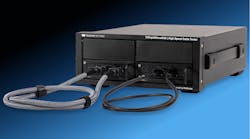Advanced Cable Tester Meets USB Type-C, HDMI 2.1 Requirements
This article is part of the TechXchange: Critical Connections: Cables, Wires, Vias, and Busbars.
The explosion in connected devices isn’t just putting pressure on wireless systems and infrastructures—it’s placed significant speed and performance demands on wiring and cabling as well.
The latest generation of cables must transfer signals 2X to 4X faster than legacy solutions, plus deliver much more power. To meet the latest stringent design and production requirements, these wires and cables need new kinds of testing to ensure quality data transmission with zero defects.
Poor cables not only fail the new market requirements for high-speed performance, but cable manufacturers that either inadequately test high-speed cables or resort to custom-built test-equipment racks waste money in a costly and slow process that doesn’t meet the demand.
Automated Cable Tester
To address these issues, Teledyne LeCroy developed an automated cable tester (see image above) to meet the production test requirements of USB Type-C, HDMI 2.1, and other advanced cables at transfer rates up to 48 Gb/s. The automated tester quickly performs all required electrical and signal-integrity tests, with low upfront capital equipment and operating costs.
The RapidWave4000’s USB Type-C cable ports support data transfer via USB4, USB 3.2, DisplayPort 2.0, Thunderbolt 3, and Thunderbolt 4 standards. Meanwhile, its Production Module rapidly performs production tests such as continuity, dc resistance (DCR), quiescent current and E-marker readout (for USB Type-C cables), and signal-integrity insertion-loss testing. An Advanced Signal Integrity Module tests impedance profile, intra-pair and inter-pair skew and crosstalk, while providing high-resolution insertion loss and eye diagrams.
The RapidWave4000 has a breadth of test capabilities that fully satisfies high-volume, high-speed production test requirements, as well as the failure analysis tests needed for quality assurance. Its low-cost replaceable adapters enable the modules to connect to different cable types, while ensuring test consistency over many test cycles. A pay-per-test option can reduce capital equipment costs up to 40%.
Read more articles in the TechXchange: Critical Connections: Cables, Wires, Vias, and Busbars.

